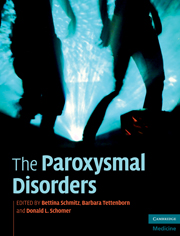Book contents
- The Paroxysmal Disorders
- The Paroxysmal Disorders
- Copyright page
- Contents
- Contributors
- Chapter 1 Paroxysmal attacks: diagnostic gold standards and history-taking
- Chapter 2 Paroxysmal disorders in childhood
- Chapter 3 Syncope
- Chapter 4 Sudden falls
- Chapter 5 Paroxysmal headaches
- Chapter 6 Paroxysmal vertigo attacks
- Chapter 7 Paroxysmal visual disturbances
- Chapter 8 Paroxysmal paresis
- Chapter 9 Paroxysmal dyskinesias
- Chapter 10 Cramps, spasms, startles and related symptoms
- Chapter 11 Myoclonus
- Chapter 12 Paroxysmal memory loss
- Chapter 13 Dissociative seizures
- Chapter 14 Anxiety
- Chapter 15 Vegetative seizures
- Chapter 16 Episodic ataxias
- Index
Chapter 12 - Paroxysmal memory loss
Published online by Cambridge University Press: 06 December 2010
- The Paroxysmal Disorders
- The Paroxysmal Disorders
- Copyright page
- Contents
- Contributors
- Chapter 1 Paroxysmal attacks: diagnostic gold standards and history-taking
- Chapter 2 Paroxysmal disorders in childhood
- Chapter 3 Syncope
- Chapter 4 Sudden falls
- Chapter 5 Paroxysmal headaches
- Chapter 6 Paroxysmal vertigo attacks
- Chapter 7 Paroxysmal visual disturbances
- Chapter 8 Paroxysmal paresis
- Chapter 9 Paroxysmal dyskinesias
- Chapter 10 Cramps, spasms, startles and related symptoms
- Chapter 11 Myoclonus
- Chapter 12 Paroxysmal memory loss
- Chapter 13 Dissociative seizures
- Chapter 14 Anxiety
- Chapter 15 Vegetative seizures
- Chapter 16 Episodic ataxias
- Index
Summary
Keywords
- Type
- Chapter
- Information
- The Paroxysmal Disorders , pp. 158 - 163Publisher: Cambridge University PressPrint publication year: 2010
- 2
- Cited by



